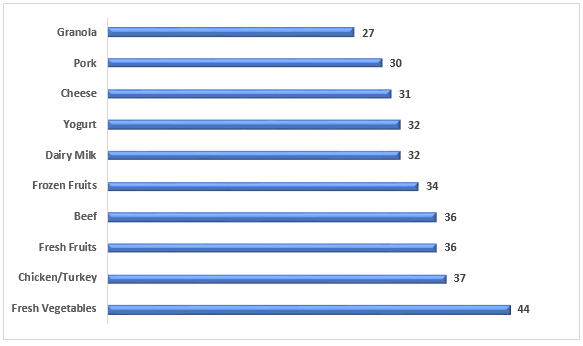- Home
- About Us
- Industry
- Services
- Reading
- Contact Us
MENA Organic Food Market Seen Soaring 11% Growth to Reach USD Million by 2030, Projects UnivDatos
Author: Himanshu Patni
January 27, 2024
According to a new report by UnivDatos, the MENA Organic Food Market is expected to reach USD 6 Billion in 2030 by growing at a CAGR of 11%. The Middle East and North Africa (MENA) region have seen a substantial surge in the consumption and production of organic food in recent years. This shift is not merely a trend, but a conscientious choice made by consumers and stakeholders towards healthier, sustainable, and environmentally friendly alternatives. The MENA organic food market has witnessed a remarkable evolution, reflecting a growing consciousness about food quality, health concerns, and environmental sustainability.
Demand for Organic Food in MENA:
The demand for organic food in the MENA region has experienced a noteworthy upsurge, primarily fueled by increasing health awareness among consumers. Health-conscious individuals are seeking alternatives that are free from pesticides, chemicals, and genetically modified organisms (GMOs). The desire for safer and more nutritious options has significantly contributed to the market’s expansion.
Consumers are also becoming increasingly aware of the environmental impact of food production. This awareness has led to a rise in demand for organic products due to their eco-friendly cultivation methods, which promote biodiversity and reduce the use of synthetic chemicals.
Access sample report (including graphs, charts, and figures) – https://univdatos.com/reports/mena-organic-food-market?popup=report-enquiry
FIG #: Shopping for Organic Food- The Percentage of people willing to pay 20% more or higher for organic groceries:

Applications and Variety:
The MENA organic food market encompasses a wide array of products ranging from fresh produce like fruits and vegetables to grains, dairy, meat, and processed foods. Additionally, the market extends beyond basic food items to include personal care products, beverages, and even clothing made from organic materials. Local and traditional products hold significant importance in the MENA region, and this is reflected in the organic market as well. Consumers show a preference for indigenous organic foods, creating a unique market for traditional produce and products.
Cost Dynamics:
One of the prevailing challenges in the MENA organic food market is the perceived higher cost of organic products compared to conventional ones. The production process of organic food involves more labor and meticulous farming practices, leading to slightly elevated prices. However, increased consumer awareness about the long-term health benefits and the positive environmental impact of organic farming is gradually reshaping perspectives, making consumers more willing to invest in these products despite their higher price point. Efforts are being made to bridge this cost gap by implementing government subsidies, promoting local organic farming, and encouraging technological advancements that can potentially lower production costs while maintaining organic standards.
Manufacturing and Production:
The manufacturing and production of organic food in the MENA region involves adherence to stringent regulations and certifications to ensure the authenticity and quality of organic products. Government bodies and certification agencies play a vital role in monitoring and regulating organic standards, certifications, and labeling, thereby building consumer trust in the authenticity of organic products.
Local farmers and agricultural producers are increasingly adopting organic farming practices. This shift involves utilizing natural fertilizers, crop rotation, and biological pest control methods to maintain soil fertility and minimize environmental impact. These practices not only ensure healthier produce but also contribute to the overall sustainability of the agricultural sector.
Click Here To View the Report Description & TOC –https://univdatos.com/reports/mena-organic-food-market
Conclusion:
The MENA organic food market is witnessing a paradigm shift in consumer preferences towards healthier and more sustainable choices. The rising demand for organic food reflects a growing awareness of health and environmental concerns among consumers. Despite challenges such as higher costs and the need for more widespread adoption of organic farming practices, the market continues to expand with promising opportunities for stakeholders across the region. The future of the MENA organic food market looks promising, driven by increasing consumer awareness, government initiatives, technological advancements, and the continuous efforts of stakeholders to meet the rising demand for organic and sustainable products. This trajectory towards a more conscious and sustainable food system signifies a positive and impactful change for the MENA region’s food industry.
Get a Callback
Related News
Subscribe to our newsletters
By submitting this form, I understand that my data will be processed by Univdatos as indicated above and described in the Privacy Policy. *
